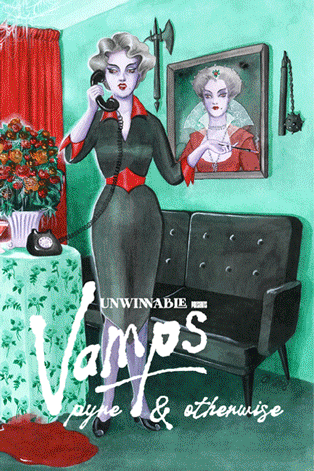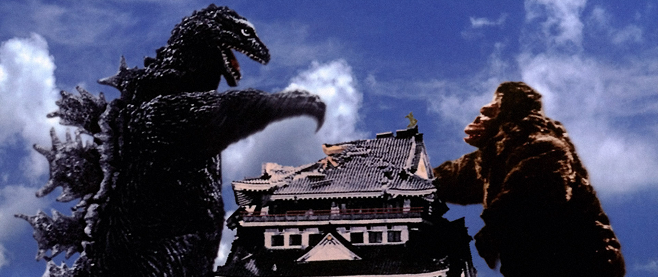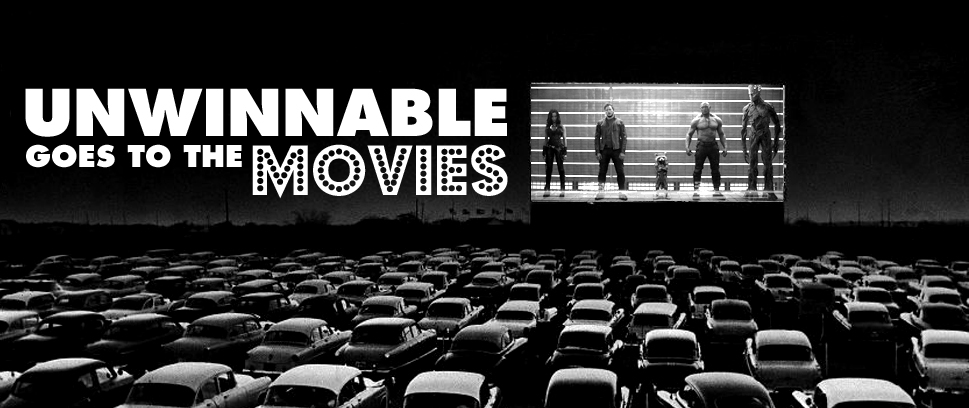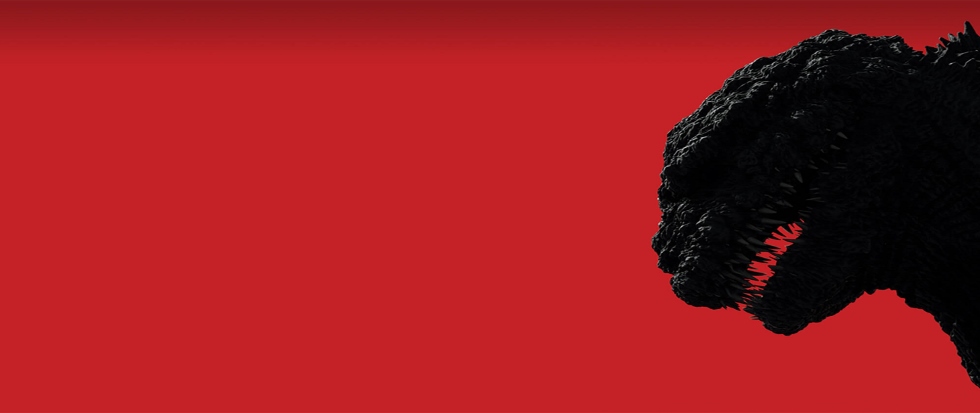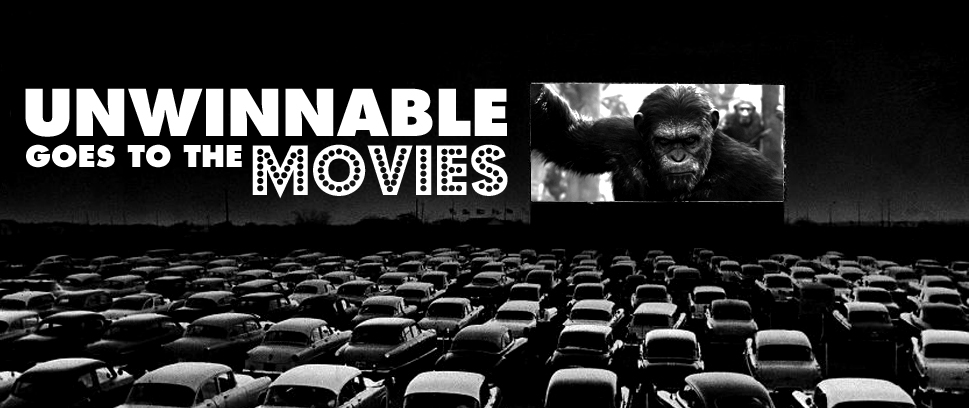
Unwinnable Goes To The Movies: Dawn of the Planet of the Apes
Over the weekend, Team Unwinnable encouraged its members to see Dawn of the Planet of the Apes and have a discussion about it. This is that discussion.
———
I just saw Dawn of the Planet of the Apes. I liked it. It was a bit long and more than a little heavy handed, but I enjoyed it. Honestly, my favorite part was the music. Michael Giacchino’s score called back to Jerry Goldsmith’s original theme in all the right scenes but he also composed a score that was uniquely his. Alexandre Desplat went a similar route with his Godzilla score. It was clearly his own (there’s little if any direct reference to Akira Ifukube’s original score), but it feels like an iconic Godzilla soundtrack. Giacchino’s music fit the film perfectly, complimenting the tension when it had to and underscoring some of the movie’s quieter moments. Anyway…who else saw it this weekend?
– Ian Gonzales
Amazingly, I actually saw a movie this weekend and it was even the RIGHT ONE! I’m just disappointed I have to keep my thoughts to a blurb. How Dawn tackled its themes of fear, violence, trust and control surprised me for a summer blockbuster that cost $170 million. I don’t know how damning this is, but it was probably the most intellectual movie I’ll see until the fall.
– Owen R. Smith
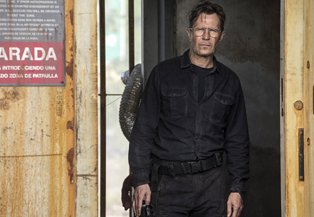 Prior to watching Dawn of the Planet of the Apes, my last brush with the franchise was that abominable Tim Burton movie. Looking back, I don’t know why I deigned to see it, because before that, the Planet of the Apes franchise was as the Sunday Afternoon Movie when I was a kid – a slightly less boring alternative to staring at the ceiling.
Prior to watching Dawn of the Planet of the Apes, my last brush with the franchise was that abominable Tim Burton movie. Looking back, I don’t know why I deigned to see it, because before that, the Planet of the Apes franchise was as the Sunday Afternoon Movie when I was a kid – a slightly less boring alternative to staring at the ceiling.
I had heard Dawn called the best post-apocalyptic movie ever (not by a longshot) and the best war movie in recent memory (maybe, sorta). It turned out to be an effective allegory examining society’s cyclical and inexorable drive to power and violence. I can’t recall another summer blockbuster with such philosophical themes. It certainly wasn’t boring.
As the good works of noble men and apes are undermined by the self-serving, hate-filled schemes of other, I found myself reminded of the way Mrs. Carmody slowly exerts her hysterical control over the survivors in the supermarket in The Mist. Koba would find a strong ally in Carmody. Unlike The Mist, though, Dawn takes great pains to give nuance to character motivations, even the villains. Carmody is a religious lunatic meant to provoke loathing in the audience but Koba is no mustache-twirling villain. Every character in Dawn acts with a mind toward protecting their own kind. The audience disagrees with Koba, but only after they understand and sympathize with his perspective.
The lone exception to this is Gary Oldman, starring as Bryan Cranston slumming it in Godzilla, who inexplicably changes from conflicted warrior-leader to suicidal maniac. I love seeing Oldman on screen as often as possible, but his presence in Dawn was puzzling and added nothing. I would have much rather had a Generic Serious Old Actor in the leader role – maybe then we’d have been spared the perplexing heel-turn that seemed designed to satisfy a contractual clause promising Oldman’s character an explosive death. Am I alone in thinking that this summer, the trend of sticking big name actors (the aforementioned Cranston, Paul Giamatti in Amazing Spider-Man 2, the entire cast of Expendables 3) in slightly larger than cameo roles has become particularly distracting?
– Stu Horvath
Given that I thought Rise of the Planet of the Apes was complete garbage – and hardly the “smart” summer blockbuster that it was purported to be by the general populace – I’m not entirely sure why I on a whim also decided to go see Dawn, either. With the sentiment being that it was “better than the (reboot) original!” I went in fully expecting more or less what was depicted on the oddly-off poster, with Caesar marshaling his ape army for a climactic and predictable summer movie showdown.
Instead Dawn was quite a pleasant surprise. Rather than your typical comic book-style (isn’t that structurally all a summer movie really is anymore?) action-whatever, it took the time to characterize its post-apocalypse. The tonal shift alone from Rise made it worth viewing, and I appreciated that as a war film, such as it was, it dared to not really shove shallow set pieces down your throat. It was a far more deliberate film than Rise, one about world exposition. The fact that, as Stu put out, it bothered with philosophical themes was something I really liked about it. Ballsy move for something released in July 2014.
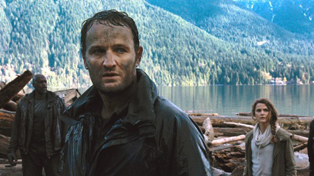 I’m surprised I haven’t seen this parallel mentioned (even at Polygon, where they probably should have picked up on it), but what the film reminded me of the most was The Last Of Us. Both pieces use the desperation of encroaching circumstances (so to speak) to illustrate Stu’s point about our inner penchant (innate, really) for violence and power – even if there’s a difference in the motivations that drive Koba and Joel to the lengths they each go in order to protect what’s most important to them.
I’m surprised I haven’t seen this parallel mentioned (even at Polygon, where they probably should have picked up on it), but what the film reminded me of the most was The Last Of Us. Both pieces use the desperation of encroaching circumstances (so to speak) to illustrate Stu’s point about our inner penchant (innate, really) for violence and power – even if there’s a difference in the motivations that drive Koba and Joel to the lengths they each go in order to protect what’s most important to them.
That said, the image of Koba riding to war on horseback wielding an M4 (note: not an AK) is an effective and sad one since we do understand his perspective. (Interestingly, it also echoes Caesar’s pose on the movie poster.)
Stu, I agree with you about Gary Oldman. It felt like there were some scenes missing or a whole character arc that was cut or something. His character wasn’t really needed in the film at all – his shift seemed designed to give a “bad guy” element to something that seemed to be more interested in exploring the gray areas of “human” nature. But that’s the nature of summer moviemaking. Oh, I also picked up on Giacchino’s score – definitely had a very ’60s influenced tone, which was obviously not a mistake.
– Steve Haske
For the bulk of the movie, Oldman is a fine, if puzzlingly non-central, presence. It’s just that mad turn at the end. Very cartoonish in an otherwise thoughtful movie (I can’t believe I just used the word thoughtful to describe a Planet of the Apes flick). Anyway, if this performance helps Oldman get the money to make Smiley’s People, I am all for it.
Now that you mention it, there was a lot of post-Simian Flu San Francisco that reminded me of post-Cordyceps Pittsburg – the way nature has reclaimed the urban environments, the costuming choices and, in particular, the rather symbolic use of both cities’ iconic bridges. Weirdly, though, I don’t feel the Dawn is particularly post-apocalyptic in the same way as The Last of Us. Sure, most of the population is gone, but the world itself didn’t instill the bleakness of, say The Road Warrior. Any despair I felt was inspired by the base hatefulness of man and ape.
For the record, I’m not against comic book action fests, so long as Michael Bay’s name isn’t anywhere near them. Also, I liked the soundtrack well enough, but Giacchino’s work seems forever tied to Lost for me, and I have a hard time getting that taste out of my mouth. Makes you wonder why I am bothering to watch The Leftovers…
– Stu Horvath
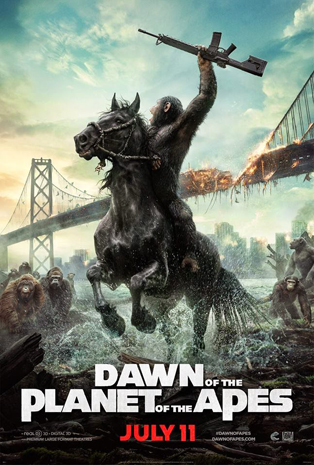 I caught Dawn of the Planet of the Apes on Sunday afternoon with what seemed like most of the rest of the local primate population. It was the first opening weekend I’d bothered to make it to in quite some time and I committed the rookie error of arriving quite late.
I caught Dawn of the Planet of the Apes on Sunday afternoon with what seemed like most of the rest of the local primate population. It was the first opening weekend I’d bothered to make it to in quite some time and I committed the rookie error of arriving quite late.
My girlfriend and I settled for a couple of seats near the front, and though it ended up costing me a sore neck it turned out to be the perfect point to observe the social interactions of the chimps that surrounded us.
Two young females were especially engaged with the previews for what seemed like a pretty sad lineup of fall films. Every explosion and one-liner, every swell of music and fast cut elicited great laughter and hoots from this bonded pair. They continued their wordless communication as the movie finally started until a community elder established his dominance with a loud clearing of his throat.
At first he was greeted with silence, until a nervous laughter spread throughout the crowd. His actions had been approved by the whole and the young females, cowed, were silent. The movie turned out to be quite good but it was that moment that revealed human nature at its most basic. We are all, quite actually, just apes in clothing.
– Owen R. Smith
Yeah, that’s just it, Stu – Oldman works, though he’s underused, and seems to have as much dimension as any of the other main cast (that scene where he’s crying over the pictures of his family?) as far as screen time affords throughout most of the film. Then suddenly he’s an insane man with C4. There were a couple of other cartoonish moments in the script that stuck out, but his shift was definitely the most jarring. It definitely has the feeling of something being excised. But sure, if he can make Smiley’s People that’s great – A Most Wanted Man looks fantastic (and PSH’s death all the sadder).
They take their post-apocalypses in different directions, since they have to. After all, there aren’t any Cordyceps-infused primates running around what’s left of San Francisco. Instead we get the scared, desperate remains of humanity (again, though, like Oldman, this is a sketch at best) that has banded together out of necessity and fear of the unknown. Because of that I’m not sure we’d need the despair of what’s left of mankind in the world, since the Simian Flu had all but petered out. But any further despair beyond the ape/human nature parallels might’ve toppled the movie (or killed Hollywood’s interest).
Aside from the striking similarities in art direction and costuming, though, I do think there’s a lot of overlap in the themes. I’m not opposed to comic book films either – look at how amazing Winter Soldier was! But I’m increasingly harried over their generally formulaic nature, which I was glad to see generally subverted here.
Giacchino’s score worked well enough (for me, he’ll always be the Medal of Honor guy) though beyond making it feel more cohesively like the originals, it didn’t stand out all that much to me (apart from using xylophones during battle scenes). Maybe Ian has more on that.
– Steve Haske
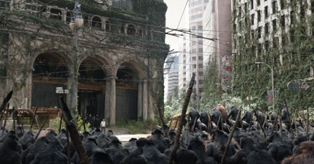 I agree with Stu that Dawn does not feel like a particularly apocalyptic world despite most of the Earth’s population being dead. Maybe it’s that San Francisco didn’t feel especially overrun to me, or maybe it was the surprisingly large amount of survivors and their access to small army’s worth of guns. They were going to run out of fuel in what, two weeks? Things never felt that bad.
I agree with Stu that Dawn does not feel like a particularly apocalyptic world despite most of the Earth’s population being dead. Maybe it’s that San Francisco didn’t feel especially overrun to me, or maybe it was the surprisingly large amount of survivors and their access to small army’s worth of guns. They were going to run out of fuel in what, two weeks? Things never felt that bad.
I would have preferred to see less survivors living in harsher conditions but that’s nitpicking what is clearly the most intelligent summer blockbuster to come out in years. This isn’t a case of wanting Alien and getting stuck with Aliens, as Steve might say.
You have to appreciate that Matt Reeves tried to make something that had something to say, though the real themes of the movie have hardly been talked and we’ve been stuck with surface-level drivel about whether Dawn is anti-guns or not.
– Owen R. Smith
I think it’s a matter of scale. Recently I’ve been editing a piece on The Purge (look for it in an upcoming issue of Unwinnable Weekly), a horror film about this annual nationwide government-imposed period of utter lawlessness. The film takes place entirely in one house that’s being attacked, so a common complaint was that there was no sense of what was going on with in the rest of the country.
The post-apocalypse scenario for the humans in Dawn was the weak link in the script’s chain (two weeks? couldn’t it have been two months? Doesn’t waiting that long to undertake such a vital mission seem sorta silly?) but similarly it feels like Reeves just wanted the audience to be as in the dark about any other survivors as the survivors in San Francisco were. (The actual army presence not appearing at all in the film, interestingly not the case in the original cut, also lends itself to that effect.)
Definitely nitpicky, though the fact we’re criticizing such small inconsistencies means that the film is actually worth the mantle of “smart” that so many claimed Rise had earned.
– Steve Haske
With so many great games and movies in this particular genre (and even more mediocre ones), the expectation that you nail those kinds of details has never been higher. Also, the whole “two weeks from doom” thing was the worst part of the script. Steve, it doesn’t just seem sort of silly that they would wait that long, it seems downright stupid. It’s a huge plot hole, but just like you said about RPGs, this is what happens when you look too closely.
– Owen R. Smith
Very true. I hope the next Apes film will hold itself up to the mark that Dawn set (never thought I’d say that) but Hollywood being Hollywood, I have my doubts. They’ve set up something that might well be akin to the Monsters sequel, which is supposed to be a war film in the vein of Heart of Darkness, but that’s not Gareth Edwards writing or directing, so…
– Steve Haske
It’s very clear that the next film will be a war film. I hope it can say something new about war, or at least de-politicize it enough that usual themes most war movies touch on are given new light. I have to say that as far as war films go, I’m tired of WWII. There have been other wars, but Hollywood being Hollywood, it’s apparently easier just to recycle the same actors and costumes every couple of years. If talking apes are what it takes to get a break, I’m all for it.
– Owen R. Smith
Apes in costumes! That’s Hollywood.
Yeah, “two weeks from doom” bit definitely stuck out to me, but for all the impact it had on how the action proceeded, I essentially just ignored it. For me it was two months (or whatever). Oldman could have just flubbed the line. (He didn’t, but you get my point.) Very few things (especially movies) don’t break down under the kind of scrutiny we’re giving Dawn. At least I am thankful that it wasn’t Pacific Rim.
If it’s going to say anything new about war or cast it in a new light, I think it’ll come down to Caesar and his now-conflicted character. The human/ape parallels could make for some fascinating philosophical notions about “gray” nature of warfare, but more than likely it’ll just be a loud point-by-point action siege. That said, Matt Reeves is directing again, so all is not necessarily lost. (It also makes you wonder how Neil Druckmann is adapting The Last Of Us for film, if that project ever gets off the ground.)
That said, I do find it funny (and quite telling) that the most compelling and thoughtful characters I’ve seen in a film this summer are a bunch of talking apes. Also, I take it back – I just realized I’ve had part of the film’s score stuck in my head so I guess it works in its unconventionality.
– Steve Haske
Before Dawn of the Planet of the Apes was released, I remember reading that is was a loose remake of Battle for the Planet of the Apes. I watched Battle the other day – that is simply not true. 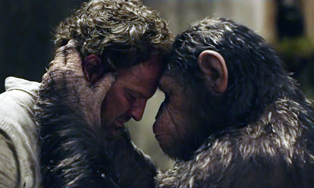 While Dawn and Battle cover similar plot grounds, the similarities end at Caesar’s apes and a group of humans trying to figure out how to live on a post-apocalyptic Earth. The philosophies behind both films are irreconcilable. Battle‘s plot was all about circumventing the inevitably of the first movie’s events. Caesar, along with many of his apes and some humans, want to live together peacefully, while a gorilla general and mutated humans living in New York City’s ruins want to kill everything that is not them.
While Dawn and Battle cover similar plot grounds, the similarities end at Caesar’s apes and a group of humans trying to figure out how to live on a post-apocalyptic Earth. The philosophies behind both films are irreconcilable. Battle‘s plot was all about circumventing the inevitably of the first movie’s events. Caesar, along with many of his apes and some humans, want to live together peacefully, while a gorilla general and mutated humans living in New York City’s ruins want to kill everything that is not them.
In the end, reason conquers all (and the mutant humans die) so Caesar’s apes and a bunch of humans forge a new timeline where apes and humans live in harmony (with silver screen legend John Huston as an orangutan lawgiver). Battle for the Planet of the Apes is a hoot of a ham-fisted movie, but I would never accuse it of being smart. It undoes the cynical twist at the end of the original Planet of the Apes film.
Meanwhile, the whole point of Dawn of the Planet of the Apes is the inevitability of innate selfishness, and that the value of life isn’t so much making good things happen – rather, it’s about dealing with the consequences of other people’s foolish actions. It’s deeper than any previous Apes movie, that’s for damn sure. The ending is a punch in the gut.
Yeah, the “two weeks from doom” thing was a narrative conceit to get the apes and humans fighting faster, as well as snuffing the life out of the humans’ illumination metaphor. The human desire to “turn the lights on” led directly to their doom. It made Dawn a remarkably cynical summer blockbuster more in line with the tone of the original film. It’s an unconventional flick with, as Haske points out, an unconventional soundtrack. I adore that soundtrack. I’m listening to it right now, giving myself the creeps.
– Ian Gonzales
